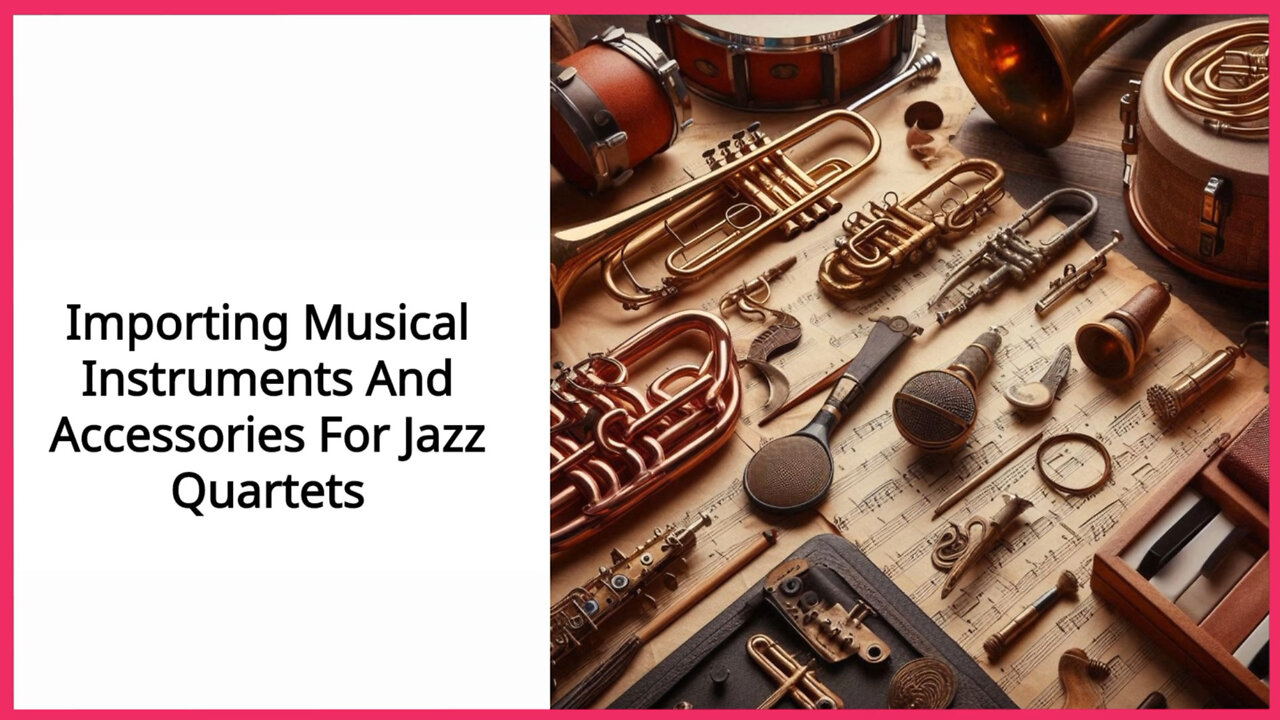Premium Only Content

Discover the Melody of Importing Musical Instruments for Jazz Quartets
ISF Customs Broker
800-710-1559
isf@isfcustomsbroker.com
https://isfcustomsbroker.com
In this episode of our Customs Brokerage series, we delve into the realm of importing musical instruments and accessories for jazz quartets. We begin by emphasizing the importance of understanding the customs brokerage process, particularly the need for a customs bond. This financial guarantee ensures adherence to US Customs and Border Protection (CBP) regulations while safeguarding both the government's interests and the timely release of goods.
To navigate the complexities of customs requirements, it is highly advisable to engage the services of a licensed customs broker. These intermediaries handle paperwork, provide regulatory guidance, and ensure compliance with customs procedures, allowing importers to focus on their music business.
Another key area to consider is the Importer Security Filing (ISF), an electronic form that must be submitted to the CBP at least 24 hours prior to loading goods onto a vessel bound for the United States. Accurate and timely completion of the ISF is critical to avoid penalties and delays in the import process.
When importing musical instruments and accessories for jazz quartets, it is important to be aware of any restrictions or regulations specific to the type of instrument being imported. Instruments are typically classified under the harmonized system (HS) code 9207, which determines the applicable duty rate based on the instrument type. Consultation with a customs broker is advisable to ensure accurate classification and to explore possible duty exemptions or reductions.
Certain musical instruments may require additional permits or certifications to comply with international trade regulations, especially those made with protected species or specific materials. A Customs broker can assist in obtaining these permits, ensuring a legal and streamlined import process.
Proper documentation is crucial for any import, and it is essential to have all required invoices, bills of lading, packing lists, and other relevant paperwork readily available. Organized documentation facilitates the customs clearance process.
In summary, importing musical instruments and accessories for jazz quartets can be an exciting venture, but a thorough understanding of the customs brokerage process is vital to avoid pitfalls. Working with a licensed customs broker, complying with customs bond requirements, submitting the ISF in a timely manner, understanding harmonized system codes, and maintaining proper documentation will contribute to a smooth and successful import process. Thank you for joining us today, and be sure to subscribe to our channel for more insightful episodes on customs brokerage and international trade.
#usimportbond
#isfcustomsbroker
#uscustomsclearing
#isfentry
Video Disclaimer Here: This video is for educational purposes only and we are not affiliated with any US government agencies/companies/individual/etc.
0:29 - Importing musical instruments and accessories for jazz quartets requires understanding the customs brokerage process, including the necessity of a customs bond for compliance with U.S. Customs and Border Protection (CBP) regulations.
0:57 - It's highly recommended to work with a licensed customs broker, who can assist with paperwork, advise on regulations, and ensure proper compliance, thereby simplifying the import process for musicians and music lovers.
1:24 - Important aspects to consider include timely submission of the Importer Security Filing (ISF), proper classification of instruments under harmonized system codes for duty rates, and obtaining any necessary permits for instruments made from protected materials. Proper documentation is crucial for a smooth customs clearance process.
-
 LIVE
LIVE
Viss
9 minutes ago🔴LIVE - Is Delta Force the Best Casual Extraction Shooter? - Delta Force
81 watching -
 LIVE
LIVE
The Rubin Report
1 hour agoElon Musk's Major Announcement Reveals His Next Target & It's Huge
3,460 watching -
 LIVE
LIVE
Steven Crowder
2 hours ago🔴 The True Cost of Fat Pride: How It's Destroying America
26,718 watching -
 2:24:25
2:24:25
Matt Kohrs
9 hours agoFed's FOMC Decision Day Chaos || The MK Show
48.4K3 -
 LIVE
LIVE
Caleb Hammer
1 hour agoI've Never Met A Woman Like This | Financial Audit
182 watching -
 LIVE
LIVE
LFA TV
15 hours agoREMOVE MIKE JOHNSON! | LIVE FROM AMERICA 12.18.24 11am EST
4,590 watching -
 LIVE
LIVE
MYLUNCHBREAK CHANNEL PAGE
2 hours agoBuildings That Shouldn't Exist?
913 watching -
 42:09
42:09
BonginoReport
3 hours agoLock Her Up (Ep.107) - 12/18/2024
71.9K93 -
 LIVE
LIVE
Vigilant News Network
15 hours agoLiz Cheney’s Problems Just Got WORSE | The Daily Dose
1,009 watching -
 22:04
22:04
Scammer Payback
17 hours agoTorturing a Scammer Till They Give Up
11.8K11